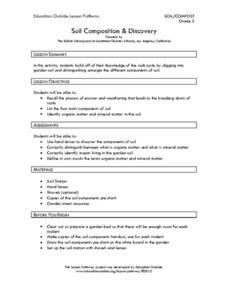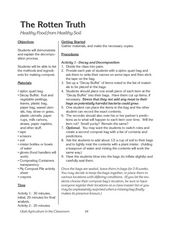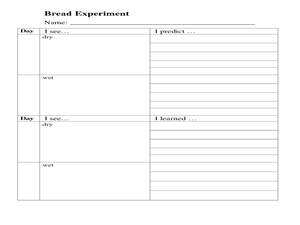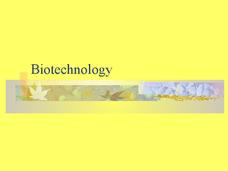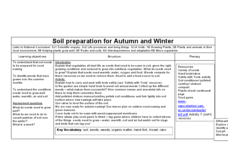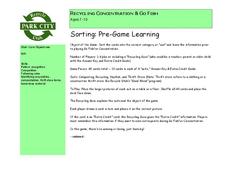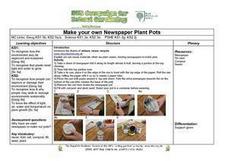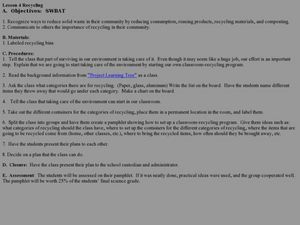Curated OER
Can Worms See?
Second graders discuss the previously created worm compost and the importance of living creatures to the Environment. In this worm lesson, 2nd graders observe worms and record their sensitivity to light. Students design a petri dish...
Curated OER
Soil Characteristics
Components of soil, such as inorganic or organic materials are detailed along with the main contributions of each. Deposits, weathering, and distinct types of characteristics and properties of soil classes are given.
Education Outside
Soil Composition & Discovery
Organic or mineral? How does the matter matter? Second graders use their knowledge of the rock cycle to label the different components in garden soil.
Curated OER
Selecting Soil Organisms in Compost
Learners conduct an experiment to demonstrate that many of the enzyme systems needed to break down society's wastes exist in nature among the decomposers in a compost pile. They culture compost bacteria on starch agar to examine the...
Curated OER
The Rotten Truth: Healthy Food from Healthy Soil
Young scholars investigate methods of decomposition in order to make compost. In this decomposition science lesson, students set up compost bags using food and materials which decay over time. The initial lesson is approximately 30...
Curated OER
Sustainable Agriculture
Students perform an experiment to find out if plants grow best when grown in soil with no fertilizer, with chemical fertilizers, or with compost that they have made themselves. Students discover how agriculture practices can benefit the...
Curated OER
Recyclers Revisited
Fifth graders observe their plant experiments that they started in a previous lesson and examine the role of decomposers in the nitrogen cycle. Two weeks after they set up a worm terrarium, they analyze any changes they observe, and...
Curated OER
The Rotten Truth
Fourth graders investigate compost. In this Science lesson, 4th graders take notes on the components of soil and its relation to plant growth. Students describe the steps in making compost.
Curated OER
Forest Decomposition
Students explore decomposition. Students define and describe components of the decomposition process. Students make a composter in a terrarium. Students record observations and changes weekly, drawing conclusions about the results of...
Curated OER
Biotechnology
A continuous cascade of information comes through this PowerPoint on biotechnology. The topic is defined, a history is presented, and basic genetic engineering techniques are explained. The topic is covered in an objective manner,...
Curated OER
Soil Preparation for Autumn and Winter
Students determine how and why soil needs to be prepared for the fall and winter seasons. In this agriculture lesson plan, students determine how to use gardening tools safely. They show how to work with compost material and fertilizer...
Curated OER
Investigating the Compost
High schoolers are introduced to the concept of biodegradability. In groups, they use the internet to research the types of materials that affect the process. They collect materials from their local community and develop an experiment...
Curated OER
Selecting Soil Organisms in Compost
Students demonstrate that many of the enzyme systems needed to break down--and therefore clean up-society's wastes already exist in nature among the decomposers. They select the best starch-munching organisms by altering the environment...
Curated OER
Worms: Nature's Recyclers
Students explore vermi-composting. For this vermi-composting lesson, students listen to the story Diary of a Worm and discuss the parts of a worm. They create worm bins and add organic food for the worms to recycle.
Curated OER
Causal Patterns in Ecosystems Section 3
Students design and create a worm and worm free compost tanks for observation of decay in ecosystems. They make predictions, care, and revist tanks using their journals for observation and data collection.
Curated OER
Trash Disposal Choices
Students determine the differences between reusable, compostable and recyclable trash.
Curated OER
How Long Until Dirt
Third graders examine the difference between composting and wasting food. They problem-solve what to do about leftovers after lunches so good food doesn't go to waste.They study food storage techniques that are environmentally friendly...
Curated OER
A Shredding We Will Go
Young scholars take charge of a recycling project . In this environmental issues lesson, students manage a paper recycling project and use compost made from the recycled paper to beautify trees.
Curated OER
Observing Decomposition
In this science worksheet, students focus upon the concept of decomposition and collect data in order to make interpretations or observations.
Curated OER
Recycling Concentration & Go Fish
Students play a game based on concentration or memory to place recyclable items into one of 4 groups. For this recycling lesson, students work in groups of 1-4 to place cards with pictures of various items into a Composting, Recycling,...
Curated OER
Make Your Own Newspaper Plant Pots
Students make plant pots out of newspaper as part of a recycle, reuse, and reduce lesson. In this recycling lesson, students fold a piece of newspaper to make a pot in which to start plants. They fill it with compost and plant seeds.
Curated OER
Organic and Inorganic Recycling
Students examine their role in polluting the environment and discuss the importance of recycling. In groups, they place earthworms into compost piles to observe why they are considered natural recyclers. They also practice sorting a...
Curated OER
Recycling: lesson 4
Students create plans in order to reduce solid waste. In this recycling lesson plan, students discuss and come up with plans to reduce consumption, reusing products, recycling materials, and composting and then present their plans to the...
Curated OER
The Effects of Trash and Garbage On the Environment
Students recognize the importance of solid waste management. In this science lesson plan, students analyze individual solid waste management habits as they enhance their knowledge of solid waste disposal and the recycling process.




